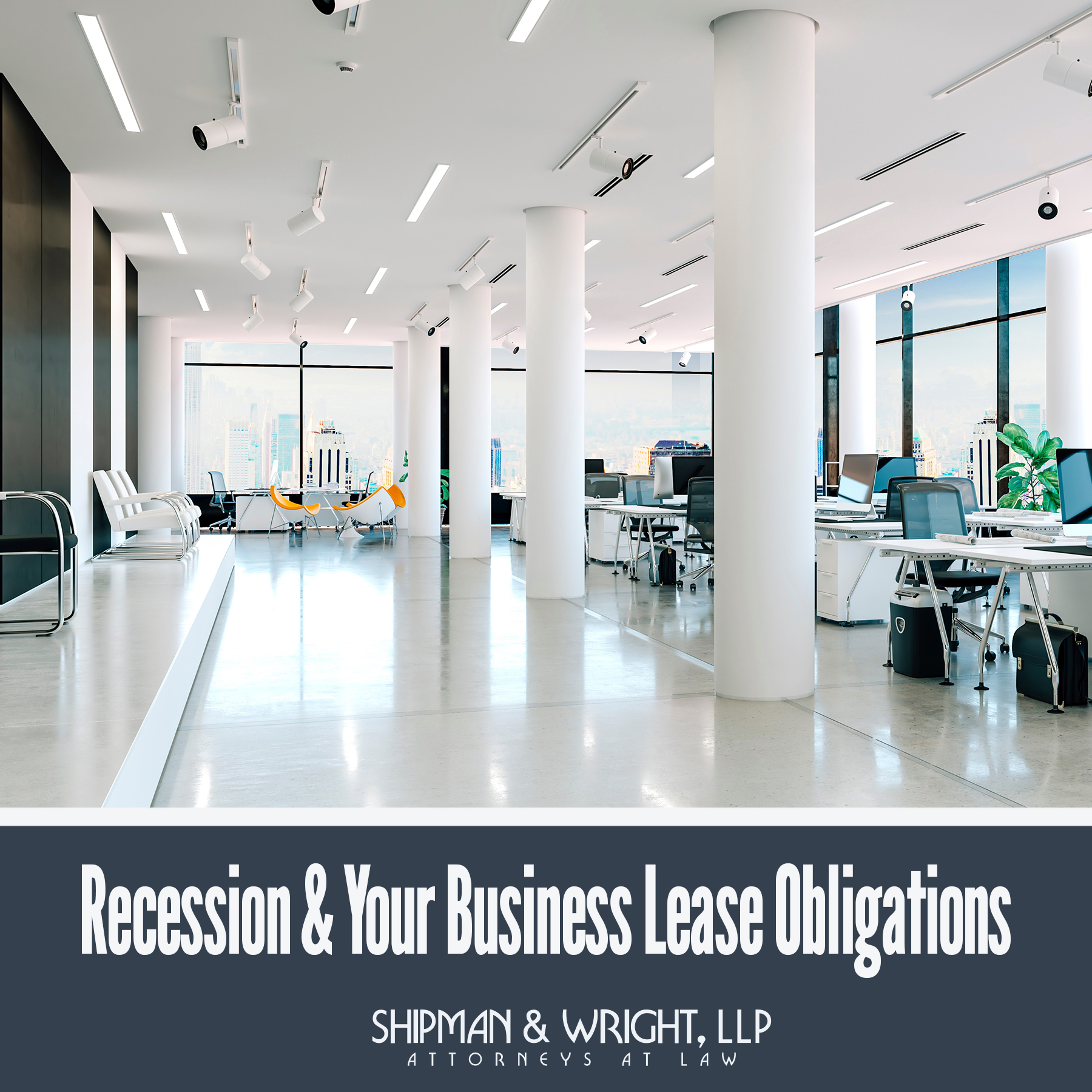Written By Attorney Joshua MacNamara
LEASES – LANDLORD & TENANT – DURING A RECESSION
As business and office leaseholders navigate their operations post COVID and during this current inflationary rollercoaster, it is vitally important to manage and mitigate landlord and equipment lease issues and obligations (office, retail, and equipment) – BEFORE they get to a point of no return if there is any bit of concern relating to the ability to meet them.
LEASES – LANDLORD & TENANT – DURING A RECESSION
Along with many small and mid-sized businesses, Lessors of office, retail, and equipment are experiencing increased operating expenses across a wide range of services in fulfilling their obligations to their tenants / lessees. For example, fuel surcharges for landscaping, increased janitorial costs for supplies and paper products, along with increased vendor / labor expenses at renewal, accounting functions and collections, and property taxes.
OFTEN PASSED ON TO THE TENANT / LESSEE
In almost all instances, the increased expenses are passed on to tenants through lease clauses permitting the pass-through during the lease or at renewal. Pass-throughs can also include property taxes over a base year and sometimes can be quite large if the landlord doesn’t take steps, if appropriate, to contest its tax bill to try and limit the impact on their tenants.
ECONOMIC UNCERTAINTY + INFLATION + INCREASED OPERATING EXPENSES = RISK
As we speed into the next round of Fed interest rates hikes, quarterly economic reports, and end-of-year reviews of business performance, it is important to take a look at your leases to understand what your exposures are.
DO YOU KNOW YOUR OBLIGATIONS?
Are pass-through expenses allowed in your lease? …Are any pass-throughs reasonable? …Has your landlord taken steps to reduce their expenses BEFORE passing them on to you? …Are you likely to experience a rent increase at or during renewal? …Are you impacted by your own business operating costs possibly making it difficult to make future payments? …Are you using the space, have too much space, or not utilizing leased equipment relative to the obligation? …Are you allowed to return equipment or space? …Should you?

WRITE IT DOWN IN SHORT FORM…ABSTRACT!
Careful attention should be given to understand and make an abstract of your business leases. Abstracts make available to you, and provide a summary, of important terms and conditions. It’s simply a concise document highlighting your lease obligations…and those of your lessor…readily available…and can help efficiently manage risk and obligations.
Many lessees can barely recall the nuances of their agreements. For example, are you aware of your base rent? …Landlord’s basis for any pass-throughs under the agreement to date? ….Expiration date? …Renewal notice required? …Does the lease automatically renew? …Are pass-through expenses even allowed? …Did your landlord take steps to dispute its large tax bill BEFORE passing the increase on to you? …When do significant pass-throughs occur? …What happens in the event of default…or what constitutes a default under your lease agreement?…Did you give a security deposit? …Is your security deposit due to you in the form of refund after a good payment history?…Are you personally liable for the lease?
RISK AND OPERATING EXPENSES CAN BE DISCUSSED
In certain instances, landlords and lessors of equipment are willing to work with their tenants and lessees when they face operating challenges and may be willing to craft reasonable solutions to help keep businesses operating and not lose them on their rent roll and balance sheets.
Loss of a tenant or equipment lease carries with it the loss of income, issues for the landlord with their lenders in connection a tenant / lessee default, unexpected expenses to refit space for another tenant, or the need to resell equipment at a reduced price impacting balance sheets. In addition to transaction costs to re-let and resell, the lessor can possibly find itself tied by the bankruptcy process where control is to some degree lost to the bankruptcy court.
RISK CAN BE MITIGATED OR RESOLVED DEPENDING ON THE TYPE FOR BOTH PARTIES…DISCUSS IT!
When discussion between the parties takes place, pathways forward can lead to creative solutions limiting risk benefitting both parties.
Discussions relating to current or expected default can include…
1) RENT REDUCTION – RENT DEFERRAL – PAYMENT RELIEF
Generally, these take the form of reduction in rent or deferral of rent. Reductions can sometimes be crafted for a specific period of time to allow some breathing room to tenants. Deferrals of rent allow past due or upcoming rent to be repaid at an agreed date. Deferrals are helpful because they can help to avoid default and credit impacts if the conditions are structured creatively. With both forms, some negotiation is required and the landlord will require something in exchange for the reduction or deferral…this presents a unique opportunity for landlord and tenant to limit exposures.
Some creative forms:
- Deferring the rent obligation by adding reasonable interest with a repayment scheduled in the future
- Straight-line amortization of past due or upcoming rent over remaining monthly rent payments
- Landlord can also consider an Extension of Term Agreement / Lease – this allows the landlord the ability to show its lender a longer term lease on its rent-roll, reduce its risk profile with the lender, while increasing the probability of having a financially healthy and long-term tenant.
- A personal or business guarantee to the landlord in the form of a co-signer or line-of-credit in the event of default
2) DEPOSIT – USE OF
- In some instances, with an established landlord-tenant relationship, and a landlord with a focus on avoiding vacancy, it may be possible to discuss application of any deposits on account to be used against any current rent obligations.
3) TRANSFER OF OBLIGATION – LEASEHOLD – SUBLEASE OR ASSIGNMENT – RELEASE
When space or equipment is underutilized, inefficient, or too large to allow healthy operation, a form of transfer or release may be in order.
Some possible options:
- Subleasing part of, or the entire space to reduce operating costs.
- Assignment of the remaining lease obligation to another user possibly eliminating the obligation
- Release of obligation
- With any of the above, the landlord / lessor can reduce its risk depending on form while possibly adding another tenant, that may grow, to its rent roll…or free up space to re-let at market rents.
4) LEASE BUY-OUT
In some limited instances, a negotiated buy-out may be an option. The landlord or equipment lessor may be willing for a negotiated price, terminate the obligation, affording the business breathing room to continue operation for an agreed period of time, elsewhere, at other existing locations, or in the future when economic conditions are more stable.
PATHWAYS FORWARD
At Shipman & Wright we can help you understand your obligations and mitigate legal exposures. We navigate and help create pathways forward with the focus to avoid potential defaults and minimize lease-related concerns BEFORE they become bigger than they need to be…allowing you to focus on stabilizing operations so you can grow your business…and not be a casualty of this current inflationary rollercoaster.
Joshua MacNamara
Attorney
Mitigation & Resolution
Shipman & Wright, LLP
Raleigh – Wilmington







